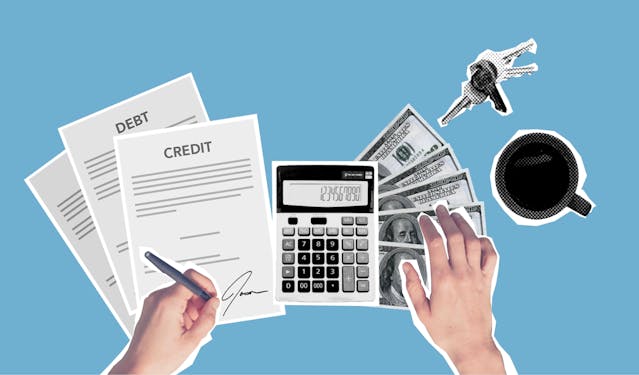In this article, we’ll discuss the key factors you should consider before deciding whether a personal loan is the right choice for you.
What is a Personal Loan?
A personal loan is a type of installment loan that can be used for various purposes, such as debt consolidation, home improvement, or even a vacation. Unlike a mortgage or car loan, a personal loan is unsecured, meaning it does not require collateral. This makes it a popular option for those who don’t want to risk their assets.
Personal loans have a fixed repayment term, usually between 1-7 years, and come with a fixed interest rate. This means you’ll know exactly how much you need to pay each month and can plan your budget accordingly.
Types of Personal Loans
Personal loans come in various forms, including secured, unsecured, fixed-rate, and variable-rate loans. Secured loans require collateral, while unsecured loans do not. Fixed-rate loans have an interest rate that remains the same throughout the life of the loan, whereas variable-rate loans have an interest rate that can fluctuate over time.
Personal Loan Uses
Personal loans can be used for an array of expenses, from consolidating high-interest debt to funding a dream wedding. They are also a popular choice for covering medical expenses, financing a major purchase like appliances or furniture, or even helping to pay for education costs that aren’t covered by student loans.
The Application Process
The application process for a personal loan typically involves submitting personal and financial information to a lender, who will then review your creditworthiness. The lender will consider factors such as your credit score, income, employment status, and financial history.
What to Consider Before Applying for a Personal Loan

Loan Amount and Interest Rates
Before applying for a personal loan, it’s crucial to determine how much you need and whether you can afford to repay it. Personal loan amounts can range from a few thousand dollars to tens of thousands of dollars, depending on the lender and your creditworthiness.
When considering a personal loan, it’s essential to shop around and compare interest rates from different lenders. Your credit score, income, and debt-to-income ratio will influence the interest rate you’re offered. A good credit score can help you qualify for a lower interest rate, which will save you money in the long run.
Assessing Your Needs
Carefully consider why you need the loan and how it aligns with your financial goals. Is it for a necessary expense, such as medical bills or home repairs, or is it for something non-essential, like a luxury vacation? Understanding your needs will help you determine the appropriate loan amount and avoid borrowing more than necessary.
Long-Term Financial Impact
Taking out a loan is a commitment that can last several years. Think about how the monthly payments will affect your finances over time. Will you be able to manage the payments if your financial situation changes? Consider the total interest you’ll pay over the life of the loan and how this fits into your long-term financial plans.
Comparing Lenders
Not all lenders are created equal. Some might offer more competitive rates, while others might provide better customer service or more flexible repayment terms. Research various lenders, read reviews, and perhaps seek recommendations to find the best fit for your situation.
Credit Score and History
Your credit score is one of the most critical factors in determining whether you’ll be approved for a personal loan. Lenders use your credit score to assess your creditworthiness and determine the interest rate you’ll be offered. A higher credit score can help you qualify for a lower interest rate and potentially save you thousands of dollars in interest over the life of the loan.
It’s essential to review your credit report before applying for a personal loan to ensure there are no errors that could negatively impact your score. You can also take steps to improve your credit score, such as paying down credit card balances and making payments on time.
Understanding Your Credit Score
Your credit score is calculated based on factors like payment history, amounts owed, length of credit history, new credit, and types of credit used. It’s important to understand these components and how they contribute to your overall score, so you can make informed decisions about managing your credit.
Credit Report Accuracy
Errors on your credit report can lead to a lower credit score, affecting your ability to secure a loan or resulting in higher interest rates. Regularly check your credit report for inaccuracies or fraudulent activity. If you find any errors, dispute them with the credit bureau to have them corrected.
Improving Your Credit
If your credit score is lower than you’d like, there are steps you can take to improve it before applying for a personal loan. This might include paying bills on time, reducing your credit card balances, avoiding opening new credit accounts, and paying off outstanding debts.
Financial Planning
Before taking out a personal loan, it’s crucial to consider your current and future financial situation. Personal loans come with a fixed repayment term, meaning you’ll need to make regular payments until the loan is fully paid off. This could impact your ability to save for other financial goals, such as retirement or a down payment on a house.
It’s essential to have a solid understanding of your current expenses and budget before taking on a personal loan. Make sure you have a plan in place to make your loan payments and still save for your future financial goals.
Budgeting for Repayment
Create a detailed budget that includes your income, expenses, and the prospective loan payment. This will help you see if you can comfortably afford the loan without sacrificing other financial priorities. Use online calculators to simulate different loan terms and understand how they would fit into your budget.
Read more tips on how to how to create a sound budget here.
Emergency Fund Considerations
Before committing to a loan, assess the status of your emergency fund. It’s generally recommended to have savings that can cover three to six months of living expenses. If taking out a loan will deplete your savings, you may want to reconsider or adjust the loan amount.
Other Financial Goals
Think about other financial goals you have, such as saving for retirement, a child’s education, or buying a home. How will a new loan affect your ability to reach these goals? It may be necessary to prioritize or delay some goals to accommodate the additional financial responsibility of a personal loan.
Loan Requirements
Each lender will have different requirements for their personal loans. Some may require a minimum credit score, while others may have a minimum income threshold. It’s essential to review the requirements of each lender you’re considering before applying to ensure you meet their criteria.
Additionally, be sure to review the loan application process and any associated fees. Some lenders may charge an application fee or origination fee, which could impact the overall cost of the loan.
Minimum Qualifications
Before applying, make sure you meet the lender’s minimum qualifications, which could include factors like age, residency, employment status, and minimum income. Knowing these criteria upfront can save you time and prevent unnecessary credit inquiries, which could affect your credit score.
Documentation and Verification
Understand what documents and information you’ll need to provide during the application process. Lenders typically require proof of income, employment verification, identification documents, and sometimes proof of residence. Gather these documents early to streamline the application process.
Fees and Penalties
Be aware of any fees that might be associated with the loan, such as origination fees, late payment fees, prepayment penalties, or annual fees. These can add to the cost of the loan, and you’ll want to factor them into your decision-making process.
The Fine Print
Always read the fine print of any loan agreement. It’s crucial to understand the terms, including the interest rate, repayment schedule, and any clauses that could affect you financially. If you have questions, don’t hesitate to ask the lender for clarification before signing anything.

How to Apply for a Personal Loan
If you’ve decided that a personal loan is the right choice for you, here’s how to apply:
- Check your credit score and report: As mentioned earlier, your credit score plays a crucial role in the loan approval process. Before applying, make sure your credit report is accurate and take steps to improve your score if needed.
- Shop around and compare rates: It’s essential to compare interest rates from different lenders to ensure you’re getting the best deal. Be sure to consider the loan amount, interest rate, and repayment term when comparing offers.
- Gather the necessary documents: Lenders will typically require documentation such as proof of income, bank statements, and identification. Be sure to have these documents ready when you apply to speed up the process.
- Fill out the application: Most lenders allow you to apply online, which is a quick and convenient option. Be sure to provide accurate information and review the application carefully before submitting it.
- Wait for approval: The approval process can take anywhere from a few hours to a few days, depending on the lender. If you’re approved, the lender will provide you with a loan offer, including the loan amount, interest rate, and repayment terms.
- Review and sign the loan agreement: Before accepting the loan offer, be sure to review all the terms and conditions carefully. If everything looks good, sign the agreement, and the funds will be deposited into your account within a few business days.
Preparing for the Application
Before you apply, it’s a good idea to get your financial affairs in order. This might include balancing your budget, closing unused credit accounts, and consolidating debts. These actions can improve your financial profile and increase your chances of loan approval.
Understanding the Terms
When you receive a loan offer, it’s critical to understand all the terms, including the annual percentage rate (APR), which reflects the true cost of borrowing when considering fees and interest rates. Ensure you’re comfortable with the repayment period, as this will affect your monthly payment amount and total interest paid.
Negotiating Terms
Don’t be afraid to negotiate the terms of your personal loan with the lender. If you have a strong credit history or multiple loan offers, you may have leverage to secure a lower interest rate or waive certain fees. It never hurts to ask for better terms, especially if it could save you money.
Final Checks Before Signing
Once you’ve decided to proceed with a loan, give the contract one last thorough review. Double-check the numbers, confirm the payment due dates align with your pay schedule, and ensure you understand all the terms and conditions. If everything is in order, you can confidently sign the agreement.
Real-World Personal Loan Example
Let’s take a look at a real-world example of a couple considering a personal loan.
John and Sarah have been married for five years and are looking to renovate their kitchen. They estimate the cost of the renovation to be $20,000. They don’t have enough savings to cover the entire cost, but they have a good credit score and are confident they’ll be approved for a personal loan.
After shopping around, they find a lender that offers them a personal loan with a 7% interest rate and a 5-year repayment term. They decide to take out the loan and make monthly payments of $396.58 until it’s fully paid off.
If they didn’t take out the personal loan and instead used a credit card with a 20% interest rate to finance the renovation, they would have to make monthly payments of $495.20. By opting for the personal loan, they’ll save $98.62 each month, which adds up to $5,917.20 over the life of the loan.
Analyzing the Cost Savings
John and Sarah’s decision to take out a personal loan instead of using a credit card will save them a significant amount in interest charges. This savings can be put toward the loan’s principal.
Conclusion
while personal loans offer a convenient financial solution for various needs, careful consideration is paramount. Assessing your financial situation, understanding the terms of the loan, and evaluating alternatives are crucial steps before committing to borrowing. Personal loans can be a valuable tool when used wisely, but they also come with responsibilities. By making informed decisions and planning ahead, individuals can leverage personal loans effectively to achieve their financial goals while managing risks.





























